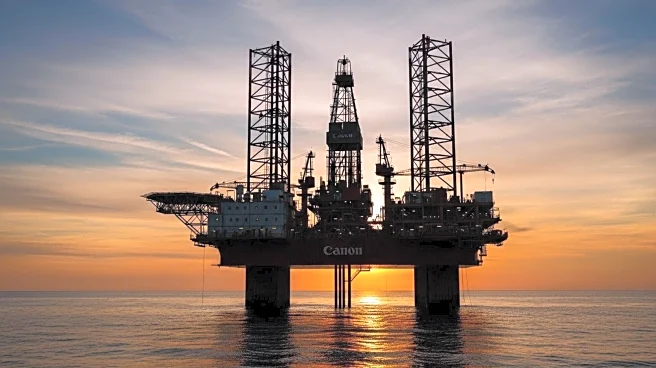What's Happening?
The world's largest self-elevating, heavy lift jackup vessel, Obana, has commenced decommissioning operations in the Southern North Sea for Perenco UK (PUK). The vessel is initially deployed on Block 48/12a, focusing on the Galahad platform, where it will undertake topside and jacket removal. Following this, Obana will proceed to the Amethyst field to dismantle the C1D, A2D, and B1D jackets, with completion and offloading expected in The Netherlands later this year. Constructed at the Damen Shipyard in Rotterdam, Obana is made from 85% recycled steel and combines two repurposed drilling rigs with a new mid-section built in Dubai. It is equipped with a 2,000-tonne crane and a deck capacity of up to 12,000 tonnes, designed for complex offshore decommissioning tasks.
Why It's Important?
The deployment of Obana marks a significant advancement in offshore decommissioning capabilities, particularly in the North Sea, a region with extensive aging oil and gas infrastructure. The vessel's ability to handle heavy and complex decommissioning tasks efficiently could set a new standard for the industry, potentially reducing costs and environmental impact. This development is crucial for the UK, which is committed to managing its decommissioning obligations responsibly while maintaining energy security. The success of Obana's operations could influence future decommissioning projects and strategies, benefiting companies involved in similar endeavors.
What's Next?
Following its work on the Galahad platform, Obana will move to the Amethyst field for further decommissioning tasks. The completion of these projects will likely be monitored closely by industry stakeholders, as it could impact future decommissioning contracts and methodologies. The vessel's performance may also prompt other operators to consider similar technologies for their decommissioning needs, potentially leading to increased demand for advanced heavy lift vessels like Obana.
Beyond the Headlines
The use of recycled materials in Obana's construction highlights a growing trend towards sustainability in the offshore industry. This approach not only reduces the environmental footprint of new builds but also aligns with broader industry goals of reducing carbon emissions and promoting circular economy principles. The collaboration between Petrodec, Dixstone, and Seatrium Offshore Technology exemplifies the potential for international partnerships in advancing decommissioning technology.










